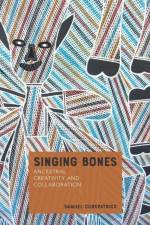av Amanda Harris
487
Music, Dance and the Archive reimagines records of performance cultures from the archive through collaborative and creative research. In this edited volume, Amanda Harris, Linda Barwick and Jakelin Troy bring together performing artists, cultural leaders and interdisciplinary scholars to highlight the limits of archival records of music and dance. Through artistic methods drawn from Indigenous methodologies, dance studies and song practices, the contributors explore modes of re-embodying archival records, renewing song practices, countering colonial narratives and re-presenting performance traditions. The book's nine chapters are written by song and dance practitioners, curators, music and dance historians, anthropologists, linguists and musicologists, who explore music and dance by Indigenous people from the West, far north and southeast of the Australian continent, and from Aotearoa New Zealand, Taiwan and Turtle Island (North America).Music, Dance and the Archive interrogates historical practices of access to archives by showing how Indigenous performing artists and community members and academic researchers (Indigenous and non-Indigenous) are collaborating to bring life to objects that have been stored in archives. It not only examines colonial archiving practices but also creative and provocative efforts to redefine the role of archives and to bring them into dialogue with contemporary creative work. Through varied contributions the book seeks to destabilise the very definition of "archives" and to imagine the different forms in which cultural knowledge can be held for current and future Indigenous stakeholders. Music, Dance and the Archive highlights the necessity of relationships, Country and creativity in practising song and dance, and in revitalising practices that have gone out of use.As contemporary Australia reckons with its past, this volume is both timely and urgent. We readers are challenged to critically reflect on how history lives on in the present - with implications not only for creativity, heritage, and the arts, but also for prosperous and equitable societies and thriving cultures, now and into the future. This unique and lively collection is a landmark in scholarship on Indigenous performing arts and the archive, with relevance for Australia and beyond.



